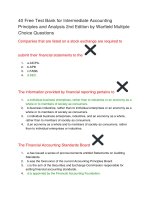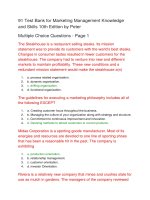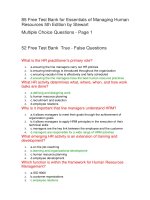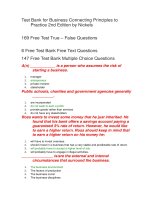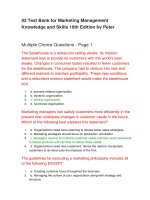Test bank for a brief orientation to counseling 2nd edition by neukrug
Bạn đang xem bản rút gọn của tài liệu. Xem và tải ngay bản đầy đủ của tài liệu tại đây (160.61 KB, 13 trang )
Test Bank for A Brief Orientation to Counseling 2nd Edition by Neukrug
Full file at />
A
Brief
Orientation
to
Counseling,
2e
Ed
Neukrug
Chapter
1:
What
Is
Counseling
and
Who
Is
the
Counselor?
Multiple
Choice
1. Hackney
and
Cormier
attribute
modern-‐day
misconceptions,
misunderstandings
and
bias
toward
the
term
“counselor”
to
the
_______________
of
the
term
itself.
A.
limitation
B.
magnitude
C.
diminishment
D.
proliferation
ANS:
D
A-‐Head:
Defining
Counseling
Learning
Objective:
LO
1
2. The
derivation
of
the
word
“psyche”
is
_____________,
and
its
meaning
is
____________.
A.
Latin;
mind
B.
Greek;
soul
C.
Latin;
brain
D.
Greek;
thought
ANS:
B
A-‐Head:
Defining
Counseling
Learning
Objective:
LO
1
3. During
the
early
part
of
the
20th
century,
vocational
counselors
disliked
the
word
guidance
and
its
heavy
emphasis
on
__________.
A.
ethics
B.
religion
C.
morality
D.
behavior
ANS:
C
A-‐Head:
Defining
Counseling
Learning
Objective:
LO
1
4. Martin
is
a
counselor
in
the
religious
sector.
Bob
is
a
vocational
counselor.
Yoshi
counsels
people
recovering
from
addiction.
Adele
is
an
elementary
school
counselor.
The
training
of
these
four
individuals,
despite
the
different
realms
in
which
they
practice,
is:
A.
largely
different.
B.
the
same,
except
for
field
placements.
Copyright
©
2017
Cengage
Learning.
All
Rights
Reserved.
Full file at />
Test Bank for A Brief Orientation to Counseling 2nd Edition by Neukrug
Full file at />C.
identical.
D.
remarkably
similar.
ANS:
D
A-‐Head:
Defining
Counseling
Learning
Objective:
LO
1
5.
“Preventive”
sits
on
the
short
term
(“guidance”)
side
of
the
counseling
continuum.
Its
counterpart
on
the
long
term
(“psychotherapy”)
side
of
the
same
continuum
is:
A.
restorative.
B.
reconstructive.
C.
regenerative.
D.
reinforcing.
ANS:
A
A-‐Head:
Defining
Counseling
Learning
Objective:
LO
1
6. According
to
the
CACREP
content
areas,
all
counselors,
through
their
educational
pursuits,
are
expected
to
have
practical
knowledge
in
all
the
following
areas
EXCEPT:
A.
professional
counseling
orientation
and
ethical
practice.
B.
social
and
cultural
diversity.
C.
human
growth
and
development.
D.
the
helping
relationship.
E.
legal
arguments
for
ethical
dilemmas.
ANS:
E
A-‐Head:
Counselors
and
Related
Mental
Health
Professionals
Learning
Objective:
LO
2
7. According
to
the
CACREP
content
areas,
all
counselors,
through
their
educational
pursuits,
are
expected
to
have
practical
knowledge
in
all
the
following
areas
EXCEPT:
A.
assessment.
B.
group
work.
C.
research
and
program
evaluation.
D.
career
development.
E.
psychopharmacology.
ANS:
E
A-‐Head:
Counselors
and
Related
Mental
Health
Professionals
Learning
Objective:
LO
2
8. The
Council
for
Accreditation
of
Counseling
and
Related
Educational
Programs
(CACREP)
is
the
accreditation
body
that
defines
the
standards
of
counseling
coursework.
Which
is
most
true
about
the
accreditation
of
counseling
programs
by
CACREP?
A.
CACREP
is
new
and
few
are
accredited
or
follow
their
guidelines.
B.
All
are
CACREP
accredited.
Copyright
©
2017
Cengage
Learning.
All
Rights
Reserved.
Full file at />
Test Bank for A Brief Orientation to Counseling 2nd Edition by Neukrug
Full file at />
C.
Most
programs
follow
their
guidelines.
D.
CACREP
accredits
programs
and
licenses
counselors.
ANS:
C
A-‐Head:
Counselors
and
Related
Mental
Health
Professionals
Learning
Objective:
LO
2
9. Rehabilitation
counseling’s
accreditation
body
is
the:
A.
Council
on
Rehabilitation
Education.
B.
Council
for
Accreditation
of
Counseling
and
Related
Educational
Programs.
C.
Association
of
Licensed
Professional
Rehabilitation
Counselors.
D.
American
Rehabilitation
Counseling
Association.
ANS:
A
A-‐Head:
Counselors
and
Related
Mental
Health
Professionals
Learning
Objective:
LO
2
10. Which
of
the
following
is
NOT
specialty
area
accredited
by
CACREP?
A.
Clinical
mental
health
counseling
B.
Marriage,
couple,
and
family
counseling
C.
Gerontological
counseling
D.
Addiction
counseling
E.
Career
counseling
F.
College
counseling
and
student
affairs
and
ANS:
C
A-‐Head:
Counselors
and
Related
Mental
Health
Professionals
Learning
Objective:
LO
2
11. NBCC
offers
all
but
which
of
the
following
certifications?
A.
Marriage,
couple,
and
family
counseling
certification
(MCFC)
B.
Master
Addictions
Counselor
(MAC)
C.
Certified
Clinical
Mental
Health
Counselor
(CCMHC)
D.
National
Certified
School
Counselor
(NCSC)
E.
National
Certified
Counselor
(NCC)
ANS:
A
A-‐Head:
Counselors
and
Related
Mental
Health
Professionals
Learning
Objective:
LO
2
12. A
school
counselor
who
has
earned
his
or
her
master’s
degree
from
a
CACREP-‐
accredited
program
would
require
at
least
______
credit
hours
of
study.
A.
120
B.
62
C.
80
D.
48
ANS:
D
Copyright
©
2017
Cengage
Learning.
All
Rights
Reserved.
Full file at />
Test Bank for A Brief Orientation to Counseling 2nd Edition by Neukrug
Full file at />
A-‐Head:
Counselors
and
Related
Mental
Health
Professionals
Learning
Objective:
LO
2
13. Which
is
NOT
a
specialty
certification
offered
by
the
National
Board
for
Certified
Counselors?
A.
College
counseling
B.
Clinical
mental
health
counseling
C.
School
counseling
D.
Addictions
counseling
ANS:
A
A-‐Head:
Counselors
and
Related
Mental
Health
Professionals
Learning
Objective:
LO
2
14. Which
association
is
mainly
for
school
counselors?
A.
SGCA
B.
NCA
C.
ASCA
D.
AAISC
ANS:
C
A-‐Head:
Counselors
and
Related
Mental
Health
Professionals
Learning
Objective:
LO
2
15. Which
is
true?
A.
All
50
states
now
have
licensure
for
counselors.
B.
All
50
states
now
have
some
type
of
marriage
and
family
licensure.
C.
Most
states
now
forbid
licensure
for
counselors
without
a
doctoral
degree.
D.
Most
states
now
have
licensure
for
couples,
marriage,
and
family
counselors.
ANS:
D
A-‐Head:
Counselors
and
Related
Mental
Health
Professionals
Learning
Objective:
LO
2
16. Which
association
is
mainly
for
clinical
mental
health
counselors?
A.
AMHCA
B.
CMHCA
C.
MHCA
D.
APA
E.
NOHS
ANS:
A
A-‐Head:
Counselors
and
Related
Mental
Health
Professionals
Learning
Objective:
LO
2
17. Which
association
do
many
marriage,
couple
and
family
counselors
join?
A.
AAMFT
B.
WPA
Copyright
©
2017
Cengage
Learning.
All
Rights
Reserved.
Full file at />
Test Bank for A Brief Orientation to Counseling 2nd Edition by Neukrug
Full file at />
C.
NAMCF
D.
MFCA
ANS:
A
A-‐Head:
Counselors
and
Related
Mental
Health
Professionals
Learning
Objective:
LO
2
18. For
a
number
of
years
there
has
been
a
movement
to
remove
the
title
“guidance
counselor”
and
replace
it
with:
A.
educational
counselor.
B.
learning
counselor.
C.
school
counselor.
D.
instructional
counselor.
ANS:
C
A-‐Head:
Counselors
and
Related
Mental
Health
Professionals
Learning
Objective:
LO
2
19. The
ASCA
National
Model
is:
A.
used
for
the
training
of
school
counselors.
B.
used
for
the
training
of
substance
abuse
counselors.
C.
a
generic
model
for
the
training
of
counselors.
D.
an
effort
to
broaden
the
focus
of
career
counselors.
ANS:
A
A-‐Head:
Counselors
and
Related
Mental
Health
Professionals
Learning
Objective:
LO
2
20. Barbara
is
seeking
to
become
a
clinical
mental
health
counselor
and
has
decided
to
join
the
related
professional
association
for
members
of
this
general
field.
She
will
likely
be
joining
the:
A.
IAMFC.
B.
IAAOC.
C.
ACCA.
D.
AMHCA.
ANS:
D
A-‐Head:
Counselors
and
Related
Mental
Health
Professionals
Learning
Objective:
LO
2
21. ___________
states
that
offer
marriage
and
family
counselor
credentialing
____________________________.
A.
Most;
allow
licensed
professionals
with
related
degrees
to
practice
marriage
and
family
counseling
if
the
practitioner
has
relevant
expertise
B.
All;
allow
licensed
professionals
with
related
degrees
to
practice
marriage
and
family
counseling
if
the
practitioner
has
relevant
expertise
Copyright
©
2017
Cengage
Learning.
All
Rights
Reserved.
Full file at />
Test Bank for A Brief Orientation to Counseling 2nd Edition by Neukrug
Full file at />
C.
All;
allow
licensed
professionals
with
related
degrees
to
practice
marriage
and
family
counseling
only
if
the
practitioner
has
two
years
of
relevant
experience
D.
Twenty-‐two;
allow
licensed
professionals
with
related
degrees
to
practice
marriage
and
family
counseling
if
the
practitioner
has
relevant
expertise
ANS:
A
A-‐Head:
Counselors
and
Related
Mental
Health
Professionals
Learning
Objective:
LO
2
22. Addiction
counselors
can
become
certified
through
NBCC
as
a:
A.
Certified
Addictions
Counselors
(CAC).
B.
Certified
Substance
Abuse
Counselors
(CSAC).
C.
Licensed
Substance
Abuse
Counselors
(LSAC).
D.
Master
Addictions
Counselors
(MAC).
ANS:
D
A-‐Head:
Counselors
and
Related
Mental
Health
Professionals
Learning
Objective:
LO
2
23. Which
is
ACA’s
division
for
student
affairs
and
college
counseling?
A.
SCCA
B.
ACPA
C.
ACCA
D.
AASCA
ANS:
C
A-‐Head:
Counselors
and
Related
Mental
Health
Professionals
Learning
Objective:
LO
2
24. Which
association
is
mainly
for
addiction
counselors?
A.
IAAOC
B.
AACA
C.
NOHS
D.
IAMFC
E.
ACA
ANS:
A
A-‐Head:
Counselors
and
Related
Mental
Health
Professionals
Learning
Objective:
LO
2
25. Which
association
is
mainly
for
rehabilitation
counselors?
A.
RAA
B.
AMRA
C.
NRCA
D.
ARCA
ANS:
D
A-‐Head:
Counselors
and
Related
Mental
Health
Professionals
Learning
Objective:
LO
2
Copyright
©
2017
Cengage
Learning.
All
Rights
Reserved.
Full file at />
Test Bank for A Brief Orientation to Counseling 2nd Edition by Neukrug
Full file at />
26. The
two
associations
which
offer
curriculum
guidelines
for
couple
and
family
counseling
are:
A.
CFT
and
LPC.
B.
LCSW
and
LPC.
C.
APA
and
CACREP.
D.
CACREP
and
COAMFTE.
ANS:
D
A-‐Head:
Counselors
and
Related
Mental
Health
Professionals
Learning
Objective:
LO
2
27. Pablo
and
his
wife,
Stella,
are
seeking
the
services
of
a
counselor
to
address
their
relationship
issues.
They
have
arrived
at
the
office
of
Father
Logan,
a
pastoral
counselor.
Father
Logan:
A.
must
have
at
least
an
undergraduate
degree
in
counseling.
B.
must
have
at
least
a
master’s
degree
in
counseling.
C.
must
have
at
least
a
CACREP
certification
in
pastoral
counseling.
D.
might
not
have
a
degree
in
counseling.
ANS:
D
A-‐Head:
Counselors
and
Related
Mental
Health
Professionals
Learning
Objective:
LO
2
28. Modern-‐day
social
workers
can
become
certified
by
the
__________
and
licensed
as
_____________
.
A.
National
Board
of
Certified
Counselors;
Licensed
Counselors
B.
Academy
of
Certified
Social
Workers
(ACSW);
Licensed
Clinical
Social
Workers
(LCSWs)
C.
National
Board
of
Social
Workers
(NBSW);
Licensed
Clinical
Social
Workers
(LCSWs)
D.
Council
for
Social
Work
Certification
(CSWC):
Licensed
Professional
Social
Workers
(LPSWs)
ANS:
B
A-‐Head:
Counselors
and
Related
Mental
Health
Professionals
Learning
Objective:
LO
2
29. Brandy
has
been
unable
to
reintegrate
into
the
workforce
since
suffering
a
minor
stroke
six
months
ago.
Her
physician
is
seeking
to
refer
her
for
career
counseling
and
rehabilitation
services.
Which
of
the
following
practitioners
would
be
least
likely
(by
means
of
training)
to
be
able
to
assist
Brandy?
A.
Mike,
an
LPC
who
is
a
member
of
the
NCDA
B.
Rodrigo,
a
member-‐in-‐good-‐standing
of
ARCA
C.
Millicent,
a
practitioner
with
an
MSW
D.
David,
a
counselor
with
a
CRCC
certification
ANS:
C
Copyright
©
2017
Cengage
Learning.
All
Rights
Reserved.
Full file at />
Test Bank for A Brief Orientation to Counseling 2nd Edition by Neukrug
Full file at />
A-‐Head:
Counselors
and
Related
Mental
Health
Professionals
Learning
Objective:
LO
2
30. The
accreditation
body
for
social
work
programs
is:
A.
the
Council
on
Social
Work
Education.
B.
the
National
Association
of
Social
Workers.
C.
non-‐specific;
there
is
no
universal
accreditation
body.
D.
the
Commission
on
Social
Work
Training
and
Certification.
ANS:
A
A-‐Head:
Counselors
and
Related
Mental
Health
Professionals
Learning
Objective:
LO
2
31. Psychology
licensure
and
requirement
protocols
are
determined
on
a(n)
____________
level.
A.
organizational
B.
county
C.
national
D.
state
ANS:
D
A-‐Head:
Counselors
and
Related
Mental
Health
Professionals
Learning
Objective:
LO
3
32. Lars’s
goal
is
to
become
a
clinical
psychologist
practicing
psychotherapy.
Which
of
the
following
degrees
would
not
entitle
him
to
engage
in
the
field
and
practice
of
his
choosing?
A.
Ph.D.
in
developmental
psychology
B.
Ph.D.
in
clinical
psychology
C.
Psy.D.
D.
Ph.D.
in
counseling
psychology
ANS:
A
A-‐Head:
Counselors
and
Related
Mental
Health
Professionals
Learning
Objective:
LO
3
33. A
psychologist
with
this
degree
tends
to
have
a
stronger
clinical
focus
and
somewhat
less
of
a
research
focus.
A.
Ph.D.
in
Counseling
Psychology
B.
Psy.D.
C.
Ph.D.
in
Clinical
Psychology
D.
Ed.D.
ANS:
B
A-‐Head:
Counselors
and
Related
Mental
Health
Professionals
Learning
Objective:
LO
3
Copyright
©
2017
Cengage
Learning.
All
Rights
Reserved.
Full file at />
Test Bank for A Brief Orientation to Counseling 2nd Edition by Neukrug
Full file at />
34. Which
of
the
following
practitioners
would
be
the
least
likely
(or
not
at
all
likely)
to
be
authorized
to
prescribe
psychotropic
medication
to
a
patient?
A.
Psychologist
B.
Psychiatrist
C.
Psychiatric
nurse
D.
Social
worker
ANS:
D
A-‐Head:
Counselors
and
Related
Mental
Health
Professionals
Learning
Objective:
LO
3
35. A
psychiatrist
is
a(n)
________
by
training.
A.
analyst
B.
researcher
C.
physician
D.
social
worker
ANS:
C
A-‐Head:
Counselors
and
Related
Mental
Health
Professionals
Learning
Objective:
LO
3
36. Which
type
of
nurse
is
authorized
to
prescribe
prescriptions
in
all
50
states?
A.
Practical
Nurse
B.
Registered
psychoanalytic
nurse
C.
Advanced
practice
registered
nurse
D.
Prescriptive-‐privilege
nursing
practitioner
ANS:
C
A-‐Head:
Counselors
and
Related
Mental
Health
Professionals
Learning
Objective:
LO
3
37. Lana
walks
past
a
door
in
a
clinic
in
her
small
town
of
Elksburg.
A
sign
on
the
door
states
“Dennis
Hastings,
Psychotherapist.”
Lana
can
safely
assume:
A.
Dennis
is
licensed
in
psychotherapy.
B.
Dennis
has
an
advanced
degree
in
psychotherapy.
C.
her
state
has
tough
legislation
regarding
who
can
call
himself
or
herself
a
psychotherapist.
D.
that
Mr.
Hastings
can
only
actually
practice
psychotherapy
if
he
is
licensed
to
do
so.
ANS:
D
A-‐Head:
Counselors
and
Related
Mental
Health
Professionals
Learning
Objective:
LO
3
38. Which
association
do
pastoral
counselors
often
join?
A.
POA
B.
NOPC
C.
ASERVIC
Copyright
©
2017
Cengage
Learning.
All
Rights
Reserved.
Full file at />
Test Bank for A Brief Orientation to Counseling 2nd Edition by Neukrug
Full file at />
D.
AACC
ANS:
C
A-‐Head:
Counselors
and
Related
Mental
Health
Professionals
Learning
Objective:
LO
3
39. Which
association
is
mainly
for
social
workers?
A.
NASW
B.
ASWA
C.
NSWA
D.
ACSWE
ANS:
A
A-‐Head:
Counselors
and
Related
Mental
Health
Professionals
Learning
Objective:
LO
3
40. Which
association
is
mainly
for
psychiatrists?
A.
APA
B.
ACA
C.
NOHS
D.
NASW
ANS:
A
A-‐Head:
Counselors
and
Related
Mental
Health
Professionals
Learning
Objective:
LO3
41. What
is
one
major
role
of
school
psychologists?
A.
To
supervise
counselors
B.
To
provide
advice
on
medication
for
learning
disabilities
C.
To
offer
ways
of
administrating
new
innovative
counseling
programs
D.
To
do
evaluation
and
assessment
of
children
in
the
schools
ANS:
D
A-‐Head:
Counselors
and
Related
Mental
Health
Professionals
Learning
Objective:
LO
3
42. .
Which
of
the
following
can
never
write
prescriptions?
A.
Psychologists
B.
Social
workers
C.
Psychiatrists
D.
Psychiatric
nurses
ANS:
B
A-‐Head:
Counselors
and
Related
Mental
Health
Professionals
Learning
Objective:
LO
3
43. .
Which
association
is
mainly
for
psychiatric-‐mental
health
nurses?
A.
PNAA
B.
APNAA
Copyright
©
2017
Cengage
Learning.
All
Rights
Reserved.
Full file at />
Test Bank for A Brief Orientation to Counseling 2nd Edition by Neukrug
Full file at />
C.
NAPP
D.
APNA
ANS:
D
A-‐Head:
Counselors
and
Related
Mental
Health
Professionals
Learning
Objective:
LO
3
44. Which
is
NOT
true
of
psychiatric
nurses?
A.
They
have
training
in
both
medicine
and
basic
counseling
skills.
B.
In
the
majority
of
states,
they
can
write
prescriptions.
C.
They
can
acquire
certifications
in
a
number
of
mental
health
areas.
D.
They
are
always
attached
to
a
board-‐certified
psychiatrist
who
oversees
their
work.
ANS:
D
A-‐Head:
Counselors
and
Related
Mental
Health
Professionals
Learning
Objective:
LO
3
45. Expressive
therapists
may
join
a
number
of
associations.
Of
the
following,
which
is
a
division
of
ACA?
A.
American
Music
Therapy
Association
B.
American
Dance
Therapy
Association
C.
Association
for
Creativity
in
Counseling
D.
American
Expressive
Therapy
Association
E.
American
Art
Therapy
Association
ANS:
C
A-‐Head:
Counselors
and
Related
Mental
Health
Professionals
Learning
Objective:
LO
3
46. Which
is
true
about
the
word
“psychotherapist”?
A.
Most
states
license
psychotherapists.
B.
Generally,
legislatures
limit
the
scope
of
psychotherapeutic
practice
to
those
with
licenses
and
do
not
license
“psychotherapists.”
C.
In
most
states,
only
a
board
certified
professional
can
call
himself
or
herself
a
psychotherapist.
D.
The
term
is
limited
to
psychologist
or
a
psychiatrist.
ANS:
B
A-‐Head:
Counselors
and
Related
Mental
Health
Professionals
Learning
Objective:
LO
3
True/False
47. Guidance
is
to
counseling
as
counseling
is
to
psychotherapy.
ANS:
TRUE
A-‐Head:
Define
Counseling
Learning
Objective:
LO
1
48. NBCC
is
a
credentialing
body
for
counselors.
Copyright
©
2017
Cengage
Learning.
All
Rights
Reserved.
Full file at />
Test Bank for A Brief Orientation to Counseling 2nd Edition by Neukrug
Full file at />
ANS:
TRUE
A-‐Head:
Counselors
and
Related
Mental
Health
Professionals
Learning
Objective:
LO
2
49. All
specialty
areas
in
counseling
tend
to
require
the
same
basic
foundational
course
work.
ANS:
TRUE
A-‐Head:
Counselors
and
Related
Mental
Health
Professionals
Learning
Objective:
LO
2
50. CACREP
provides
national
licensure
counselors.
ANS:
FALSE
A-‐Head:
Counselors
and
Related
Mental
Health
Professionals
Learning
Objective:
LO
2
51. The
training
of
psychologists
and
psychiatrists
is
very
similar.
ANS:
FALSE
A-‐Head:
Counselors
and
Related
Mental
Health
Professionals
Learning
Objective:
LO
3
52. Although
one
needs
a
doctorate
to
be
a
counselor
or
clinical
psychologist,
in
some
cases,
one
can
be
a
school
psychologist
with
a
master’s
degree.
ANS:
TRUE
A-‐Head:
Counselors
and
Related
Mental
Health
Professionals
Learning
Objective:
LO
3
53. Today,
the
differences
between
counseling
psychology
and
clinical
psychology
are
great.
ANS:
FALSE
A-‐Head:
Counselors
and
Related
Mental
Health
Professionals
Learning
Objective:
LO
3
54. The
National
Organization
of
Human
Services
is
mostly
focused
on
undergraduate
training
in
the
helping
professions.
ANS:
TRUE
A-‐Head:
Counselors
and
Related
Mental
Health
Professionals
Learning
Objective:
LO
3
55. Generally,
anyone
can
call
himself
or
herself
a
“psychotherapist.”
ANS:
TRUE
A-‐Head:
Counselors
and
Related
Mental
Health
Professionals
Learning
Objective:
LO
3
Copyright
©
2017
Cengage
Learning.
All
Rights
Reserved.
Full file at />
Test Bank for A Brief Orientation to Counseling 2nd Edition by Neukrug
Full file at />Short
Answer
56.
Briefly
describe
the
origins
of
the
confusion
that
surrounds
the
words
counseling,
guidance,
and
psychotherapy.
ANS:
Answers
will
vary
A-‐Head:
Defining
Counseling
Learning
Objective:
LO
1
57. The
CACREP
guidelines
for
counseling
programs
involve
knowledge
in
at
least
8
specific
content
areas.
List
5
of
those
8
content
areas.
ANS:
Answers
will
vary
A-‐Head:
Counselors
and
Related
Mental
Health
Professionals
Learning
Objective:
LO
2
58. Alexis
has
begun
work
on
her
Master’s
degree
in
counseling,
and
has
not
yet
decided
on
a
specialty
area.
Her
research
reveals
that
CACREP-‐accredited
programs
offer
six
different
specialty
areas.
List
four
of
them,
nothing
how
many
semester
hour
credits
would
currently
be
required
to
complete
those
training
programs.
(Hint:
The
training
hour
requirement
is
not
the
same
for
all
programs.)
ANS:
Answers
will
vary
A-‐Head:
Counselors
and
Related
Mental
Health
Professionals
Learning
Objective:
LO
2
59. If
you
are
looking
on
the
internet
for
counseling
services,
why
should
you
be
cautious
when
you
see
an
advertisement
for
someone
that
simply
identifies
them
as
a
“psychotherapist?”
ANS:
Answers
will
vary
A-‐Head:
Counselors
and
Related
Mental
Health
Professionals
Learning
Objective:
LO
3
60. Briefly
discuss
the
difference
between
a
psychologist
and
a
psychiatrist.
What
are
the
primary
similarities
and
differences
between
a
clinical
and
a
counseling
psychologist?
ANS:
Answers
will
vary
A-‐Head:
Counselors
and
Related
Mental
Health
Professionals
Learning
Objective:
LO
3
Copyright
©
2017
Cengage
Learning.
All
Rights
Reserved.
Full file at />
